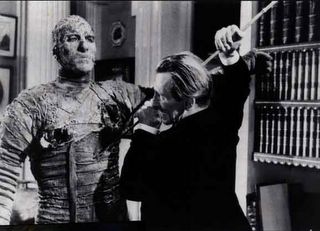The Return of the Curse of the Creature's Ghost
So, last night, I watched the Hammer Horror classic The Mummy, with Peter Cushing and Christopher Lee. It may be the best all around Hammer film. It's not as gory as some of the later ones, but it's incredibly atmospheric and the make-up on the Mummy itself (played silently by Lee) is pretty astounding for 1959.
Man, that movie rules. So imaginative, so much fun...I love Hammer films!
Anyway, while I was watching and enjoying The Mummy, I was thinking about the origin of the whole "Curse of the Mummy" legend. I mean, most of those old Universal monster movies have really obvious literary or mythological origins. Dracula is a Bram Stoker book. Frankenstein is Mary Shelly. The Invisible Man is H. G. Wells.
But what about The Mummy? All mummy movies are basically the same anyway. Some ambitious English scholar unearths an ancient crypt, thus disturbing the slumber of an ancient evil hidden away for centuries. The mummy itself always has a back story too. It's never just some random ghoul.
Usually, The Mummy was in love with a princess or something, and sometimes seeks to resurrect her or at least find a new girlfriend who looks like her. (That's what happens in the Hammer version).
Even the newer Stephen Sommers version uses the old story, to rather middling effect.
But where does it come from? Based on a bit of Internet research, it seems that, yes, The Mummy was the subject of a long-forgotten Victorian English novel. Here's the British paper The Independent:
After years of detective work by the Open University Egyptologist Dominic Montserrat, the trail of the mummy's curse has finally led back to the imagination of a young English author in the 1820s and a bizarre theatrical "striptease'' show in which Egyptian mummies were unwrapped in public.
The show took place near London's Piccadilly Circus in 1821 and seems to have inspired a little-known 25-year-old novelist called Jane Loudon Webb to write an early science-fiction book called "The Mummy."
Anyone else notice something interesting? The first "Mummy" novel was written by a woman. As was, of course, the novel that inspired Frankenstein. So few novels were written by and credited to women in those days, it's kind of odd that two of our most popular all-time monster stories both come from female authors.
Also, this original book sounds kind of interesting. I wonder if any copies even exist any more...
Set in the 22nd century, the novel featured an angry, vengeful mummy who came back to life and threatened to strangle the book's hero, a young scholar called Edric.
That would be kind of a cool...A futuristic sci-fi mummy movie. Nobody steal that idea, okay?
The article goes on to explain how, after the opening of King Tut's crypt in the 1920's, the notion of a mummy's curse became popularized.
So in 1923, when Tutankhamun's burial chamber was opened, it was another novelist, the successful author Mary Mackay (better known by her nom de plume, Marie Corelli) who applied the literary motif of the mummy's curse to the real-life discovery of Tutankhamun's tomb. Corelli issued a dramatic warning that "the most dire punishment follows any rash intruder into a sealed tomb''.
Another woman? Why aren't more contemporary horror novels written by ladies? They seem to have a historical knack for it. Anyway, the plot thickens...
The unexpected death, just two weeks later, of Lord Carnarvon, the chief intruder into King Tut's tomb, propelled the curse concept on to the world's newspapers' front pages. A so-called "ancient Egyptian'' inscription "Death shall come on swift wings to him that toucheth the tomb of Pharaoh'' was invented; and any death associated with the expedition, however remotely, was put down to the curse.
So, yeah, that's how the whole "curse of the mummy" idea came to be. Kind of interesting.
I just realized, right as I was about to post this, that I don't know where the whole "werewolf" thing comes from. I mean, I can guess it's German or something, because of the term "werewolf," which has got to be Germanic...I'm gonna look it up...
Okay, I'm back. I was right about the German thing. In the town of either Collin or Bedburg, Germany (Internet accounts differ) in 1589, there was a trial for a serial killer named Peter Stubbe. He claimed to have killed literally dozens of women and children over the course of several months. Furthermore, he claimed to have been practicing black magic since the age of 12, and that The Devil had given him a magic belt that, when put on, turned him into a Wolf Man.
Oddly, when Stubbe was caught, the hunters who captured him actually claimed to see him transform from a wolf into a man.
That's a nice story and all...but why would he take off the belt when there are people around who could recognize him. Isn't the whole point of a magic transmogrifying belt that you can keep your true, non-murderous identity a secret? Peter Stubbe, you crazy serial killing Medieval Teutonic dumbass!

1 comment:
I tend to actually prefer the Hammer versions to the old Universals most of the time...(except Whale's "Bride of Frankenstein," maybe the best monster movie of all time).
What can I say? Love Lugosi and Karloff and those guys (the first "geek" actors, really), but not quite as much as Lee and Cushing.
And actually, a lot of my favorite Karloff moments in particular come from his later Vincent Price-Peter Lorre-Roger Corman entries.
Post a Comment